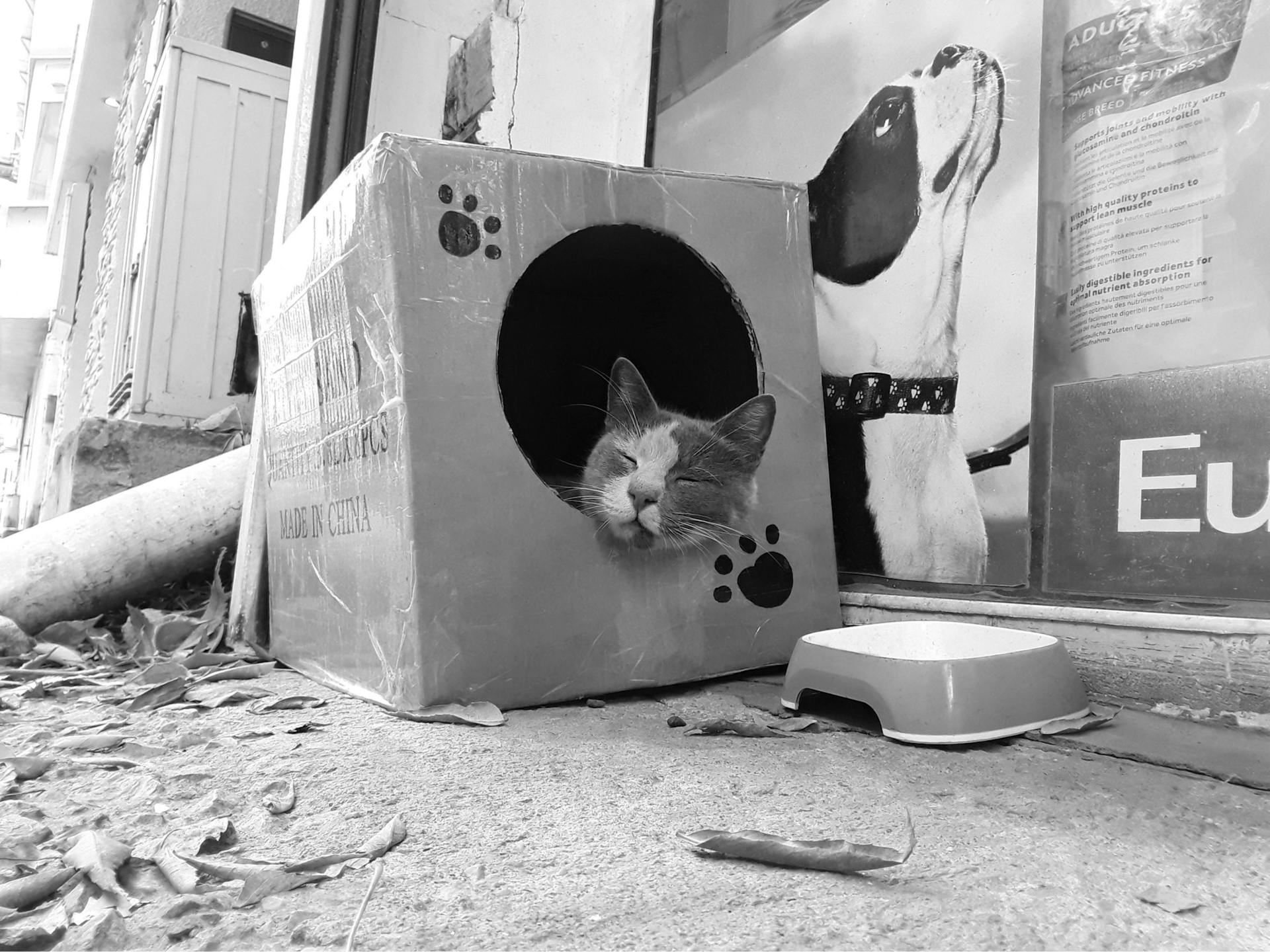
Cat owners often find themselves asking this common and perplexing question. When our feline friends stop using the litter box, it can be a frustrating and even dangerous situation. There are many reasons why cats may stop using the litter box, and understanding the root causes can be essential for getting your pet back on track with their restroom habits.
First, we must acknowledge that cats are very clean animals and do not want to use a soiled litter box. Cats may shy away from a litter box that isn’t kept clean; on average, the box should be changed two to three times a week in order to ensure hygiene. Additionally, if you recently switched from one brand of litter to another, it is possible your cat does not like the new type of litter. Be sure to always purchase a high-quality brand that you know your cat prefers.
Another common reason cats avoid the litter box is due to environmental changes or differences in routine. If you’ve recently moved house or brought a new pet into the home, your cat may need some time to adjust. Similarly, if their usual routine has been altered (ex: leaving for work later than usual) they may no longer be familiar with which space is reserved specifically for potty time. If this is the case, try restructuring your daily schedule so it becomes consistent. This can help your cat become more secure and comfortable in their new environment and allow them to relax while using their bathroom area once again.
Finally, some cats simply stop using their boxes as they get older as they may have developed medical issues related to bladder or kidney stones, diabetes or arthritis all of which can put a strain on controlling bowel movements. Make sure you take them to their regular vet check-ups, especially if this activity has become more frequent than normal over recent weeks or months – there may be an underlying cause which needs treating before full elimination control returns for your furry friend
In essence, there are several potential explanations for why cats avoid their litter boxes - keep an eye out for signs of increasing stress levels including hiding away more often than usual as well as changes in sleeping patterns; ensuring that you keep both yourself and your pet’s routine consistent will also aid with any environmental changes compromise they may have felt by adhering strictly and providing lots of love and reassurance will help them feel secure again in addition to solving reasons related to hygiene itself! By understanding the root causes of why your cat stopped using the litter box and responding accordingly with patience and understanding, this difficult problem can be remedied soon enough.
Related reading: How to Get Cat to Use New Litter?
How can I get my cat to start using the litter box again?
Cats are intelligent and resourceful, but sometimes they slip up and forget to use the litter box. This can be an unpleasant surprise for a cat guardian, but there are steps you can take to get your kitty back on track.
First, it's important to identify the underlying cause of your cat's aversion to the litter box. Stress and changes in routine could be at the heart of this behavior. Ensure that your pet is comfortable with as few changes as possible in her environment if this is the case. Consider setting up a peaceful cat-friendly sanctuary where your pet can spend time alone or watching birds for stress relief throughout the day. If there is another pet in the home that may be bothering your cat when she tries to use the litter box, consider using baby gates or other barriers to create separate spaces for each animal and give her more time away from her four-legged roommate.
Second, establish a consistent cleaning routine for your pet’s litter box so it stays pleasant and inviting. Scoop clumped waste at least once a day and change out all of the litter once every week or two. With an odifer-controlling litter like Arm & Hammer™ Deodorizing Clear Retrostep planks make daily scooping easier while keeping your home free from nasty smells!
By addressing underlying causes of stressful situations while providing a welcoming clean environment, you may be able to encourage your cat to return to proper litter box usage. With patience and consistency, you can yet again enjoy a happy home life with a clean-using feline companion!
For your interest: Clean Rabbit Litter Box
Does my cat not like the kind of litter I'm using?
Cats can be very finicky when it comes to their litter boxes, so it’s not uncommon for people to ask whether the kind of litter used could be influencing their pet’s behavior. Does your cat not seem to like the kind of litter you’re using?
Before making any big changes here some things you can consider that may help: Is the amount of litter in the box enough to make your cat comfortable? Are you cleaning the box daily, or at least every couple of days? Cats often resist changes in their environment, so introducing a new type of litter too suddenly could be cause rejection. If you decide to switch up what you’re using, gradually introduce a blend that combines your old product with the new one.
Cats make very clear when they don’t like something - excessive pawing, clawing or scaling of the inside walls are signs that your cats is unhappy with its litter setup. If these behaviors persist despite all other environmental factors being in good order then there could be something wrong with the kind of litter itself. It might be worth looking into more ‘cat friendly’ options such as clumping clay, natural clumping paper or cedar-based litters - all odour neutralizers which help reduce smell and matt tracking by trapping moisture and odours into aggregates. Remember, fewer litters inside but more often is always better than overloaded boxes which they will eventually avoid. Good luck!
Recommended read: Barkbox Boxes
Could my cat feel stressed or anxious around the litter box?
No one likes a litter box in the house, but if you’re a pet owner it’s a necessary part of keeping your cat happy and healthy. Unfortunately, cats can also sometimes show signs of stress and anxiety around the litter box. Luckily, there are some steps you can take to help your cat feel more comfortable and less stressed in their litter box.
The first thing you can do is make sure to choose the right type of litter and box for your cat. Although most cats prefer clumping litter, some cats may not like it because their paws stick to it. Additionally, if they’re used to an open-air litter box it might be better to let them transition gradually rather than making them switch overnight. Try getting a bigger litter box with higher sides so they don’t have to feel as exposed when they use it. It’s also important to make sure your cat has easy access to the litter box—placing multiple ones around the house is often helpful for older cats who can’t jump as easily anymore or those who may not like sharing the same space with other family pets.
Finally, watch out for signs that your cat might be feeling stressed or anxious around the litter box. These include long periods spent behind or near it without actually using it, increased urination outside of the litter box, hiding or running away from the area when you approach, or avoidance all together. If you have another pet in your home who seems to be bothering your cat while she visits her potty area then try using sound-proofing material such as felt or furniture wedges on nearby doors and windows to help create a peaceful environment for her visits.
Your cat feeling comfortable around their special place is essential not only for their own well-being but also yours; nobody wants an uncomfortable feline with behavioral issues in their home! With these tips in mind, hopefully both you and your pet can enjoy many years of good health and peace of mind.
Curious to learn more? Check out: Litter Box Training a Dog
Is there a medical issue causing my cat to not use the litter box?
Cats have a complex series or behaviors and questions we come across as pet owners. One of the most common questions from cat owners is, "Is there a medical issue causing my cat to not use the litter box?" The answer to this question is not always simple, but if your cat is refusing to use the litter box it could be for either behavioral or medical reasons.
When it comes to behavioral issues, cats may find the litter box unsanitary or simply unlikable. Maybe they don't like the texture of the litter or your current location is too noisy and distraction-filled for them. Whatever the cause, behavioral issues are fixable with some patience and understanding on your part. Make sure you're regularly cleaning up their waste in addition to their food and water dishes, provide enough space per litter box if you have more than one cat and keep the boxes away from loud noises.
Medical causes can include anything from a urinary tract infection to kidney failure. If there are signs that suggest your cat may be in pain such as frequent vocalizing, reduced movement or licking areas of discomfort bring them for veterinary care immediately. Your vet will be able to indicate if there’s something seriously wrong with an examination as well as order tests if necessary. Other important symptoms may involve going outside of their litter box with constant urine production, partuuclarly towards walls and windowsills suggesting marking behaviour because of stress or anxiety instead of refusing to use it.
Although we can’t determine all potential causes without seeing a veterinarian first, when it comes down to your cats behavior understanding why they’re acting out is key in fixing this problem quickly and permanently.
Here's an interesting read: Cat Litter Box
Could my cat's litter box be too small for it?
Just like humans, cats need enough space to move comfortably and to feel safe, especially in their own personal litter box. So, could your cat’s litter box be too small for it? Absolutely!
Litter box size is just as important for cat owners to consider as the design and type of litter used inside it. An ideal litter box for most cats should measure at least 18 inches in length by 15 inches in width, with just enough room for your cat to turn around and dig comfortably. Cats typically weigh between 8-10 lbs and should not have difficulty maneuvering in a larger space. If the litter box is too small then the results can include your pet having accidents outside of the box or even becoming anxious or aggressive while using the box regularly.
The importance of appropriate size factors in to other aspects beyond just comfort though. A crammed litter box may generate an unpleasant odor that could make clean up difficult over time. Additionally, if your cat becomes scared or aggressive due to a small space then animal behavior problems could arise that require intervention from an experienced vet or animal behavior expert.
Finally, when shopping for a new litter box don't forget to monitor your cat's experience while they use it; look out for signs of discomfort such as a downturned tail and chattering teeth, actively avoiding the area, or even vocalizing excessively out of frustration. To ensure your pet’s happiness consider making sure you provide them with enough room from the start!
For another approach, see: How to Use a Shock Collar to Stop Bad Behavior
Could my cat be avoiding the litter box due to improper cleaning?
Improper litter box cleaning can definitely cause cats to avoid their designated restroom area. A cat’s sense of smell is 14 times more sensitive than humans, and they have specific preferences when it comes to their bathroom area. Pet parents should ensure that a litter box is cleaned frequently by scooping out clumps at least twice a day, changing litter once a week and washing the entire unit with soap and water every two weeks.
Clumping litter should also be used for convenience, as it allows for easier removal of solid matter when scooping and adds less mess to the surrounding area when kitty kicks out her debris. Additionally, keep in mind that different types of cats have their own preferences in regards to texture and scent of the litter so if your feline friend isn't accepting the current option, try experimenting with different varieties that are specifically made for cats.
If your cat is still avoiding the litter box after proper cleaning and changing up types of available kitty litter, there could be another underlying issue such as a view or sound that makes them uncomfortable in the space or location, or if they are ill due to an age related discomfort/disease. If none of these other considerations are hindering your cat’s use of the restroom then a vet visit may be required to rule out any other hidden concerns such as urinary tract infection or kidney failure. In this case its important that pet parents don't overlook the health quotient throughout any assessmenst related tot he proper cleaning and use of the litter box but focus on one step at a time beginning with ensuring correct sanitation practices have been met first.
Readers also liked: Changing Cat Litter Brand Make Cat Sick
Sources
- https://pethelpful.com/cats/cat-not-using-litter-box-try-these-solutions
- https://www.pawtracks.com/cats/dirty-litter-box-dangers/
- https://worldanimalfoundation.org/cats/cat-not-using-the-litter-box/
- https://catvills.com/cat-stopped-using-litter-box/
- https://www.petplace.com/article/cats/pet-behavior-training/cat-behavior-training/normal-cat-behavior/14-common-reasons-cats-dont-use-litter-box/
- https://thecatsite.com/threads/litter-box-size-most-way-too-small.412282/
- https://resources.bestfriends.org/article/cat-not-using-litter-box-causes-and-solutions
- https://mrlitterbox.com/cats-tray-too-small/
- https://twocrazycatladies.com/cat-behavior/are-your-litter-boxes-too-small/
Featured Images: pexels.com


